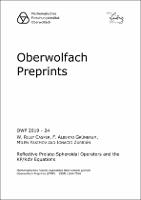Zusammenfassung
Commuting integral and differential operators connect the topics of Signal Processing, Random Matrix Theory, and Integrable Systems. Previously, the construction of such pairs was based on direct calculation and concerned
concrete special cases, leaving behind important families such as the operators associated to the rational solutions of the KdV equation. We prove a general theorem that the integral operator associated to every wave function in the infinite dimensional Adelic Grassmannian Gr $^{ad}$ of Wilson always reflects a differential operator (in the sense of Definition 1 below). This intrinsic property is shown to follow from the symmetries of Grassmannians of KP wave functions, where the direct commutativity property holds for operators associated to wave functions fixed by Wilson's sign involution but is violated in general. Based on this result, we prove a second main theorem that the integral operators in the computation of the singular values of the truncated generalized Laplace transforms associated to all bispectral wave functions of rank 1 reflect a differential operator. A 90$°$ rotation argument is used to prove a third main theorem that the integral operators in the computation of the singular values of the truncated generalized Fourier transforms associated to all such KP wave functions commute with a differential operator. These methods produce vast collections of integral operators with prolate-spheroidal
properties, including as special cases the integral operators associated to all rational solutions of the KdV and KP hierarchies considered by Airault-McKean-Moser and Krichever, respectively, in the late 70's. Many novel examples are presented.

